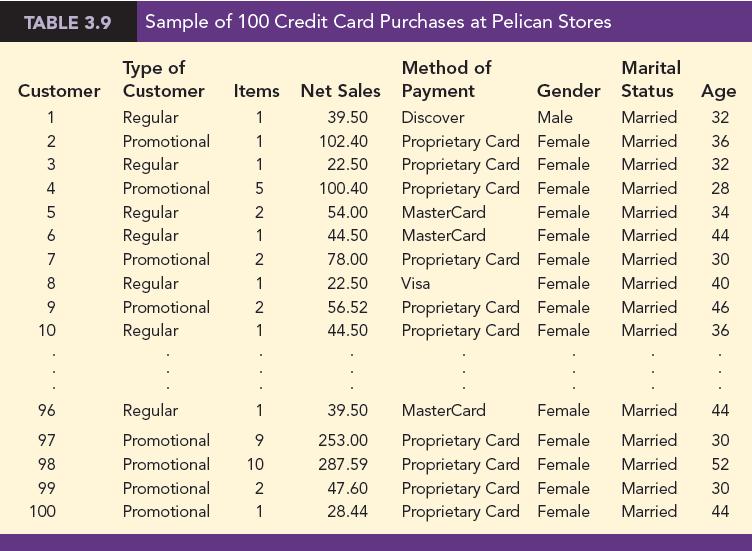Pelican Stores, a division of National Clothing, is a chain of womens apparel stores operating throughout the
Question:
Pelican Stores, a division of National Clothing, is a chain of women’s apparel stores operating throughout the country. The chain recently ran a promotion in which discount coupons were sent to customers of other National Clothing stores. Data collected for a sample of 100 in-store credit card transactions at Pelican Stores during one day while the promotion was running are contained in the file PelicanStores. Table 3.9 shows a portion of the data set. The proprietary card method of payment refers to charges made using a National Clothing charge card. Customers who made a purchase using a discount coupon are referred to as promotional customers and customers who made a purchase but did not use a discount coupon are referred to as regular customers. Because the promotional coupons were not sent to regular Pelican Stores customers, management considers the sales made to people presenting the promotional coupons as sales it would not otherwise make. Of course, Pelican also hopes that the promotional customers will continue to shop at its stores. Most of the variables shown in Table 3.9 are self-explanatory, but two of the variables require some clarification.
Items The total number of items purchased
Net Sales The total amount ($) charged to the credit card
Pelican’s management would like to use this sample data to learn about its customer base and to evaluate the promotion involving discount coupons.
Use the methods of descriptive statistics presented in this chapter to summarize the data and comment on your findings. At a minimum, your report should include the following:
1. Descriptive statistics on net sales and descriptive statistics on net sales by various classifications of customers.
2. Descriptive statistics concerning the relationship between age and net sales.

Step by Step Answer:

Essentials Of Modern Business Statistics With Microsoft Excel
ISBN: 9780357131626
8th Edition
Authors: David R. Anderson, Dennis J. Sweeney, Thomas A. Williams, Jeffrey D. Camm, James J. Cochran





